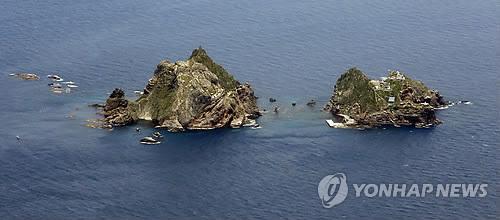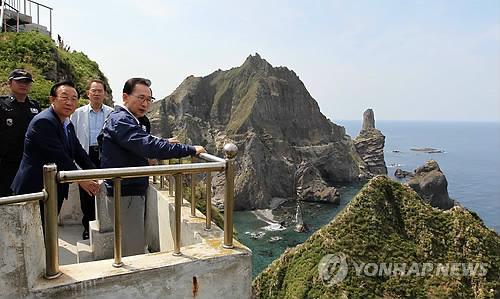By Chang Jae-soon
2012/08/10 19:57 KST
That pattern was shattered Friday when South Korean President Lee Myung-bak caught Japan off guard with a surprise visit to the islets -- the first-ever by a South Korean president -- a decision that could suggest Seoul may be shifting from its low-key policy on the matter.
The historic visit came days before South Korea observes Liberation Day on Wednesday, which marks Korea's independence from Japan's brutal colonial rule from 1910 to 1945, the source of long-running bad blood between the two neighboring nations.
"Dokdo is the end of our territory. Please make sure to defend Dokdo well," Lee said during a briefing by a police unit stationed on Dokdo. "Dokdo is indeed our territory and a place worth staking our lives to defend. Let's make sure to safeguard (the islets) with pride."
A presidential visit has been considered the strongest possible way for Seoul to assert its sovereignty over Dokdo and a final diplomatic card that would be reserved until the last minute unless Japan poses serious challenges to Seoul's control of the islets.
"In relations with Japan, our interests have tended to suffer due to fear and cautiousness so far, but we have to break away from that tendency," said Lee Jae-young, a professor at Kyungnam University. "The president should visit Dokdo every year and declare it is our territory so as to strengthen our effective control."
Analysts said political relations between Seoul and Tokyo will be strained badly at least in the short term, though most agree that economic, social and cultural exchanges between two of Asia's biggest economies are unlikely to suffer from the row.
"Though Japan could protest strongly at first, I don't think this will lead to a serious worsening of overall relations between South Korea and Japan," the professor said.
 |
In Tokyo, Japan's Foreign Minister Koichiro Gemba urged South Korea to call off the Dokdo trip.
"If the visit is made, it would go against our country's position and so we strongly urge its cancellation," Gemba told reporters in Tokyo, according to the Kyodo News agency. He also said Japan "must respond to it firmly" and the visit "would definitely have a large impact" on relations with Seoul.
Japan also plans to recall its ambassador to Seoul, Masatoshi Muto, in protest, reports said.
Tokyo has long laid claims to Dokdo in school textbooks, government reports and other ways, undercutting better ties between the two nations. Last week, Japan renewed those claims in its annual defense "White Paper" report outlining the country's defense policy.
This week, Japan also lodged a protest about Seoul's diplomatic "White Paper" that describes Dokdo as Korean territory, officials said. It was the first time Japan has protested over the diplomatic report.
South Koreans see those claims as amounting to denying Korea's rights because the country regained independence from colonial rule and reclaimed sovereignty over its territory, including Dokdo and many other islands around the Korean Peninsula.
South Korea has kept a small police detachment on Dokdo since 1954.
The territorial claims have been viewed by South Koreans as a sign Japan has not fully repented for its imperialist past, along with Tokyo's refusal to address the long-running grievances of elderly Korean women who were forced into sexual slavery for Japanese troops during World War II.
South Korea and Japan are key trade partners and cooperate closely in efforts to get North Korea to give up its nuclear weapons program. However, issues related to the past colonial rule have been a drag on their relations.
It is unclear why Lee chose to make the visit at this point, about six months before he leaves office in February, but aides said he has considered visiting the islets from the beginning of his term in early 2008, and actual plans have been in place.
"President Lee has tried to visit Dokdo a few times, but folded up the plans" due to various reasons, a senior secretary said on condition of anonymity.
Under Lee, South Korea's relations with Japan have not been bad, with Japan's then Prime Minister Naoto Kan offering the country's clearest apology yet for the colonial rule in 2010, before returning a set of centuries-old royal Korean books to Seoul to back the apology.
The two countries also pushed for what would be their first-ever military agreement, though the information-sharing deal was put on hold at the last minute. The countries also agreed to launch negotiations to forge a bilateral free trade agreement.
Some experts raised concern Lee's visit to Dokdo would cast a pall over these projects and Seoul's efforts to resolve colonial rule-related issues, such as the sexual slavery, because the visit would provide fodder for nationalistic voices in Japan.
"Of course, it is natural for our president to go to our territory," said Chin Chang-soo, a senior analyst on Korea-Japan affairs for the Sejong Institute think tank. "But we have to think about why our presidents did not go there so far. That's because it would provoke Japan too much and would not be helpful for our national interests."
A presidential visit to Dokdo should have been reserved as a "final strategic card," he said.
"Economic and civilian exchanges between South Korea and Japan have grown enough not to be affected by this kind of issue," Chin said. "But the problem is that this (visit) would lead to Japanese voices helping us on the issue of comfort women disappearing."
jschang@yna.co.kr
Source: english.yonhapnews.co.kr
oldmarine
'Yonhap' 카테고리의 다른 글
| (News Focus) S. Korea-U.S. summit to push N. Korea to review policy options (0) | 2013.09.09 |
|---|---|
| <日 한국엔 `전방위 보복'..중국엔 '유연 대응'> (0) | 2013.08.17 |
| <한중정상 공동성명 '북핵 불용' 명문화까진 못가> (0) | 2013.06.30 |
| Park asks China to be 'good partner' in Korean unification (0) | 2013.06.29 |
| Park calls for relations of 'trust' with China in university speech (0) | 2013.06.29 |
